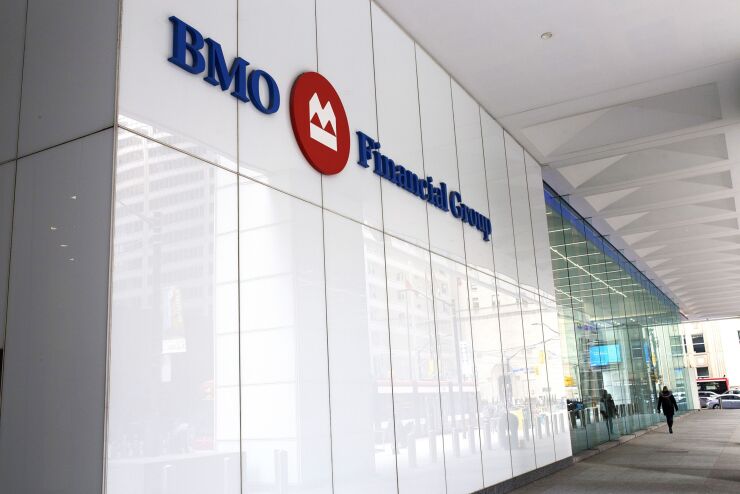A high-stakes lawsuit involving allegations that Bank of Montreal lied to a judge after a predecessor bank destroyed key evidence is slated for trial this fall, potentially complicating the Canadian banking giant’s deal to acquire Bank of the West.
The lawsuit, which grew out of a long-defunct Ponzi scheme, was filed a decade ago, but last summer BMO started making public disclosures about the possibility of a large financial liability. The plaintiff is seeking $1.9 billion in compensatory damages, plus interest, punitive damages and attorneys’ fees, BMO stated in a March 1 report to its shareholders.
The suit against BMO’s U.S. subsidiary was filed by trustees in the bankrupt businesses of Thomas Petters, seeking damages from Petters’ Ponzi scheme, which fell apart in 2008.

BMO inherited the legal exposure when it acquired Marshall and Ilsley Bank in 2011. Milwaukee-based M&I was alleged to have looked the other way as Petters, who was a client, moved money between his accounts. BMO has denied the lawsuit’s allegations.
BMO “continues to vigorously defend itself against unmeritorious allegations about the banking relationship between a company engaged in fraud and a bank that BMO acquired several years after public disclosure of the fraud,” the company said in a statement to American Banker.
Earlier in the litigation, the bankruptcy trustees sought sanctions against BMO in connection with the alleged destruction of backup documents tied to the scandal. In 2019, a bankruptcy judge sided with the trustees, finding that after M&I destroyed documents potentially containing evidence, BMO had lied about finding the backups after taking over the company.
In a blow to BMO’s defense, the bankruptcy judge ruled that a trial jury can be told of the document destruction during future proceedings.
Lawyers for the trustees have said that BMO and M&I were also found to have hidden evidence and lied to the court during discovery for a separate case in Wisconsin in 2014.
BMO said in its most recent report to its shareholders that it was appealing the judge’s ruling regarding document destruction.
Last August, BMO informed shareholders that the case might go to trial in the first half of 2022. The trial was then delayed, possibly to October, attorneys in the case estimate, as the resurgence of COVID-19 cases spurred by the omicron variant pushed back courthouse proceedings.
A legal disclosure appeared again in BMO’s Dec. 3 report to shareholders, this time with an estimate that the trial may take place no earlier than late 2022.
The legal imbroglio could draw attention from bank regulators during their review of BMO’s deal to acquire Bank of the West, experts said.
The two banks
"If U.S. regulators are aware of this huge overhang, it's still unclear if this could impact their authorization of this deal,” said a source familiar with the case.
The original scandal involving the Ponzi scheme is unlikely to raise any red flags as long as BMO has demonstrated that any managers who were implicated are no longer in place, said Jeremy Kress, assistant professor of business law at the University of Michigan and co-faculty director of the school’s center on finance, law and policy.
But the document destruction issue could be a different story, said Kress, who was previously a bank regulation attorney for the Federal Reserve.
“It does seem like the type of thing regulators would review closely as part of BMO’s merger application,” he said.
Before M&I was acquired, roughly 60 computer tapes containing backed-up emails and other information were destroyed, even though the company had a duty to retain them, U.S Bankruptcy Court Judge Kathleen Sanberg found. The tapes were the only known source of correspondence for a significant period of time between Petters and the bank.
In December 2017, years after BMO acquired M&I, the bank found backup tapes, but it didn’t tell its own attorneys for about a month, Sanberg found. The bank’s attorneys did not disclose the evidence to the plaintiff trustees until about two weeks later — “after close of business on the last day of discovery,” the judge wrote.
Sanberg wrote in her 2019 ruling that as the defendant in the case, BMO “lied to its counsel, lied to the Court, and lied to Plaintiff” as it “dragged its feet or fought production of relevant information every step of the way.”
BMO said in a statement to American Banker that it “approaches litigation with integrity and a commitment to high ethical standards, including by partnering with expert outside counsel."
BMO has said that its deal for Bank of the West, which is owned by the French banking giant BNP Paribas, is expected to close by the end of 2022. With the trial not expected to begin until the fall, regulators may have to rely on their own reviews of the issues raised by the litigation.
“Given how long these cases take in court, the agencies may not want to wait for a judicial resolution before acting on the merger application, so they might have to rely on their supervisory teams to investigate the allegations,” Kress said.
A spokesperson for the Federal Reserve said regulators could not comment on ongoing merger reviews.
Federal banking regulators and the Justice Department are currently reviewing the approval process for bank mergers, as ordered by President Biden
While regulators have continued to approve large-bank M&A deals, there is
And with the expected appointment of Lisa Cook and Philip Jefferson to the Fed’s Board of Governors, the hurdles facing big-bank mergers could get higher. Cook and Jefferson are among a slate of four Fed nominees who were recently approved by the Senate Banking Committee and are expected to be confirmed soon by the full Senate.
Along with Lael Brainard, a Fed governor who
“At a minimum we expect they will use these deals to lay out their merger policy views,” Seiberg wrote.





